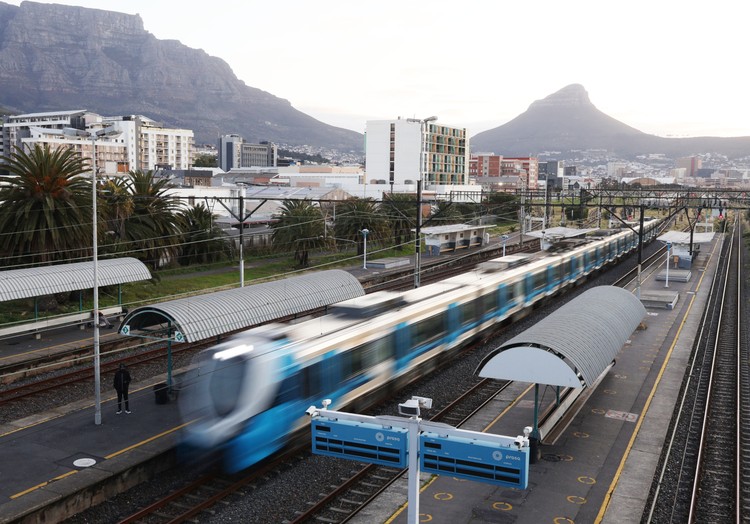PRASA finally signs rail deal with City of Cape Town
The Service Level Plan gives the City oversight over annual performance plans, station revitalisation, and the introduction of more train sets
After more than a year of negotiations, the City of Cape Town last week obtained a signed Service Level Plan from PRASA, giving the City oversight over PRASA’s commitment to improve passenger rail services in the city. Archive photo: Steve Kretzmann
- Four years ago, passenger rail services in Cape Town were virtually non-existent.
- Attempts by the City of Cape Town to get PRASA to sign a plan holding it accountable for reviving passenger rail were met with obstructions and delays.
- Continued pressure from commuter rights organisation #UniteBehind and the City has finally yielded results.
- But #UniteBehind believes the plan does not go far enough.
The City of Cape Town and the Passenger Rail Agency of South Africa (PRASA) have signed a Service Level Plan (SLP) following court action, threats of an intergovernmental dispute, and more than a year of negotiations.
The SLP, which was signed by PRASA on 5 December, could lay the foundation for the City taking over the management of passenger rail in Cape Town from PRASA.
While the SLP was being negotiated, the City conducted its own feasibility study for managing the passenger rail network, which was passed by Council on the same day the SLP was signed.
In his council speech, Cape Town mayor Geordin Hill-Lewis said he was “glad to announce” PRASA had signed the SLP “to improve Metrorail in the short-term”.
Hill-Lewis said the plan would be monitored by a joint committee with PRASA.
“This is a big step towards improving the quality and reliability of the service through a legally binding agreement, and I am very pleased that we managed to get this finalised this year,” he said.
Following a decline in the passenger rail service in Cape Town from 2013, with mismanagement, theft, and vandalism bringing it to its knees in 2020, the SLP makes PRASA responsible for regular reports to the City, with the City exercising oversight over commitments to revitalise stations, introduce more train sets, recommission services, and improve the number of daily passengers and the number of train trips.
As part of the SLP, the City also commits to providing the municipal services needed to support and enhance passenger rail; encouraging transit-oriented development along rail corridors; and expediting permits through the City’s services and development planning departments.
“Taking charge of Metrorail is especially important for lower-income households, who would save an estimated R932-milllion a year if trains were working as they should,” said Hill-Lewis.
But rail activist organisation #UnitedBehind said that while the SLP “marks progress”, it falls short of what is needed for PRASA to fully meet its Constitutional and statutory obligations to commuters.
“Despite PRASA having had over a year to finalise it, the plan lacks enforceable commitments, timelines, or measures that would enable it to function as a roadmap for improving commuter rail services,” said #UniteBehind Executive Director Zukie Vuka.
She said the document does not introduce any new obligations or standards beyond what is already in PRASA’s corporate and performance plans, making it “a repackaging of existing strategies rather than a meaningful new framework for improving rail services”.
The plan, according to Vuka, does not identify specific individuals or executives responsible for implementing its provisions, “leaving no clear structure for accountability or consequences for failure”.
“There are no initiatives to develop the skills or resources necessary to enhance the City’s or PRASA’s capacity to deliver on their public transport responsibilities.”
Vuka said that the SLP, as it currently stands, is “sub-standard” and should not be used as a model for other metropolitan municipalities.
PRASA spokesperson Andiswa Makanda had not responded by the time of publishing.
Support independent journalism
Donate using Payfast

Don't miss out on the latest news
We respect your privacy, and promise we won't spam you.
Next: Pup-up shop: new mobile clinics for dogs and cats
Previous: “Pot” Stemmet faces charges over theft of Lottery-funded equipment
© 2024 GroundUp. This article is licensed under a Creative Commons Attribution-NoDerivatives 4.0 International License.
You may republish this article, so long as you credit the authors and GroundUp, and do not change the text. Please include a link back to the original article.
We put an invisible pixel in the article so that we can count traffic to republishers. All analytics tools are solely on our servers. We do not give our logs to any third party. Logs are deleted after two weeks. We do not use any IP address identifying information except to count regional traffic. We are solely interested in counting hits, not tracking users. If you republish, please do not delete the invisible pixel.

